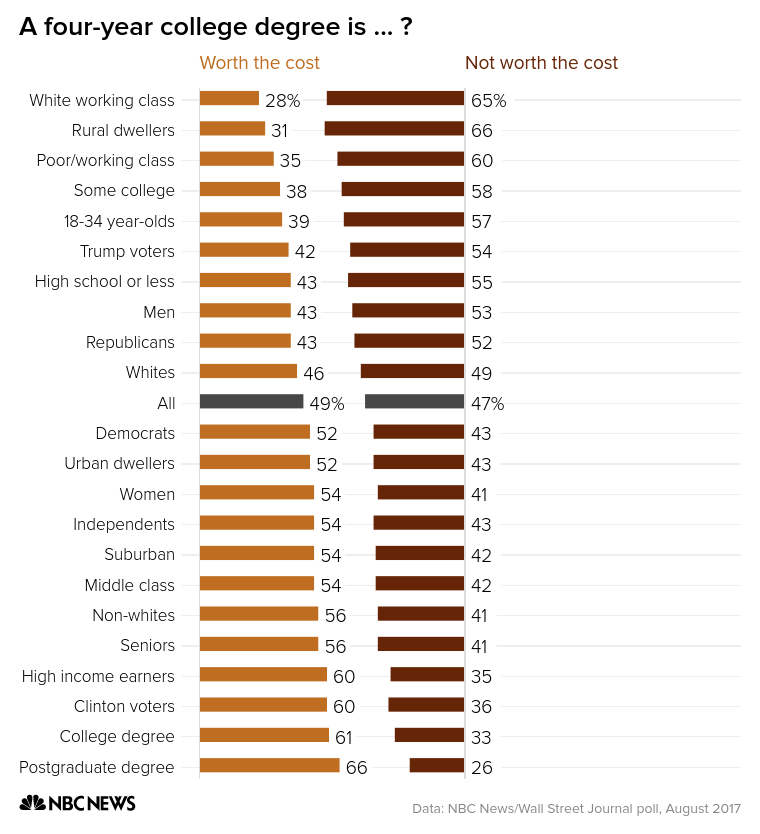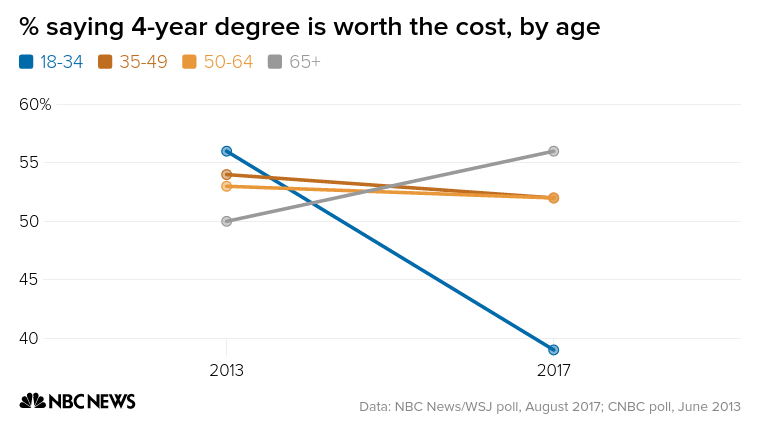Americans are becoming more skeptical that a four-year college education is worth the cost, a new poll from NBC News and the Wall Street Journal finds.
The national survey of social trends, which was conducted August 5-9, found that 49 percent of Americans agreed with the statement that a four-year degree “is worth the cost because people have a better chance to get a good job and earn more money over their lifetime.” But about the same share, 47 percent, said that a degree is not worth the cost “because people often graduate without specific job skills and with a large amount of debt to pay off.”
When pollsters posed a similar question in a June 2013 CNBC survey, 53 percent of Americans said that a four-year degree is worth the cost, while just 40 percent said that it is not.
Part of the reason for the drop? Young people have soured significantly on the idea, even as their parents’ generation has remained comparatively bullish. Among 18-34 year olds, just 39 percent now say that a four-year degree is worth the cost, while 57 percent disagree. Just four years ago, those numbers were flipped, with 56 percent of young people expressing optimism about investing in a college education, compared to just 38 percent who said it wasn’t worth the price tag.
White working class Americans also appear to have lost confidence in the value of a college degree. In 2013, about half — 49 percent — said that a college degree was not worth the cost. That’s up to 65 percent who say the same now.
Income and education level also play powerful roles in how different groups within the country view the earning potential derived from a four-year degree.

Those most likely to say that a four-year degree is not worth the cost include rural dwellers (66 percent), white working class Americans (65 percent) and those with only some college (58 percent) or only a high school education or less (55 percent).
Those most likely to call higher education a good investment include those with a college degree (61 percent) or a postgraduate degree (66 percent), high income earners (60 percent), and non-whites. (56 percent).
The data also show a gender gap in views of the value of a four-year degree. Fifty-three percent of men say a college degree is not worth the cost, while just 41 percent of women say the same.

Other recent surveys have indicated that political ideology has had a dramatic effect in recent years in overall views of higher education institutions. A Pew Research Center survey released in July, for example, showed that the proportion of Republicans and GOP-leaning independents who say that colleges and universities have “a negative effect on the way things are going in the country” jumped from 37 percent to 58 percent in just the past two years, even as Democrats remained highly positive about the role of colleges in America.
The NBC/WSJ data shows that uncertainty about the value of a college degree itself has increased among both major parties, although the wariness is more pronounced among Republicans.
In 2013, 33 percent of Democrats and 38 percent of Republicans said that a degree wasn’t worth the sticker shock. Now, 43 percent of Democrats and 52 percent of Republicans say the same.
When it comes to 2016 vote choice, 54 percent of Donald Trump supporters but just 36 percent of Hillary Clinton supporters said that a four-year degree is not worth the cost.
The NBC/WSJ “Social Trends” poll was conducted Aug. 5-9 of 1,200 adults – nearly half of whom were reached by cellphone – and has an overall margin of error of plus-minus 2.8 percentage points.

